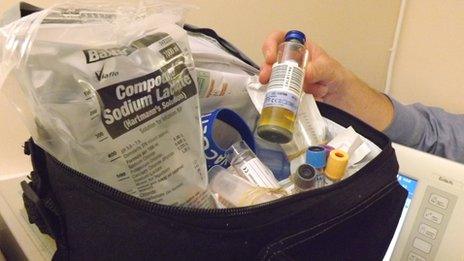Royal Glamorgan Hospital, Llantrisant, bid to fight sepsis
- Published

The response bags ensure patients receive oxygen, fluids and antibiotics within an hour of being diagnosed, said the board
A hospital is hoping to boost the treatment of patients with sepsis by stocking response bags on each ward.
Cwm Taf Health Board has introduced the bags at the Royal Glamorgan Hospital, Llantrisant, and also set up a rapid response team across its area.
The illness, in which the body has a severe reaction to bacteria or germs, kills 1,800 people a year in Wales.
It is hoped the scheme, developed by charge nurse John Burke, will be rolled out on wards across Wales.
Cwm Taf Health Board said early intervention was key to treating sepsis and could prevent patients from having to be transferred to intensive care.
Sepsis can lead to shock, multiple organ failure, and death, especially if it is not recognised early and treated promptly, said the board.
'Diagnosed'
The bags ensure patients receive oxygen, fluids and antibiotics within an hour of being diagnosed, it said.
They have already been used 70 times since their introduction in May.
Among patients to benefit was Stanley Beynon, 79, from Aberdare, who developed sepsis after undergoing a hip replacement operation in June.
"I bounced back well," said Mr Beynon. "I was in hospital for 13 days in all and I was itching to come home. The care I had was excellent."
Andrew Hermon, a senior nurse in critical care at the hospital, said the bag brought together equipment that was previously stored separately on the ward.
"We found that getting all this together at the bedside was taking a long time," said Mr Hermon.
"We're still evaluating the results but it has been very positive and is helping to prevent patients with sepsis being admitted to intensive care."
Dr Richard Jones, clinical director of anaesthetics and critical care at Cwm Taf Health Board, said the board was leading the way in early recognition and treatment of sepsis.
"If we recognise and treat it quickly we can save many lives," he said.
A Welsh government spokesperson said it had made major progress in introducing ways of detecting and reducing cases of sepsis.
"All health boards and Velindre Cancer Centre have adopted the National Early Warning Score, which is a simple system hospital staff are using to assess whether patients are developing potentially life-threatening illnesses," she said.
"They are also introducing sepsis screening tools, which help identify sepsis in patients at very early stages, meaning life-saving treatment can be given much earlier.
"Patients are being treated with the sepsis six care bundle, which consists of three quick tests for sepsis and three simple treatments that are proven to combat it.
"The sepsis bag initiative is currently being piloted, and the 1,000 Lives Plus programme will review its effectiveness before taking a decision on its future use."
- Published1 August 2012
- Published17 June 2012
- Published18 February 2012